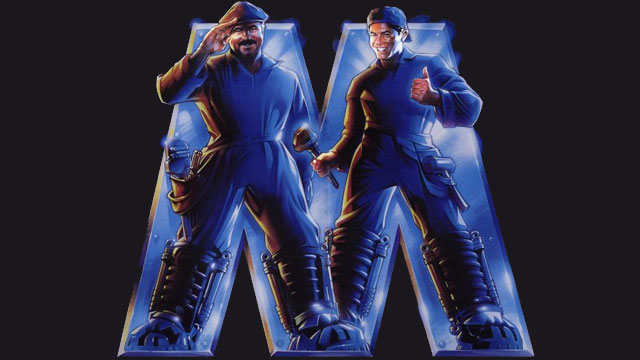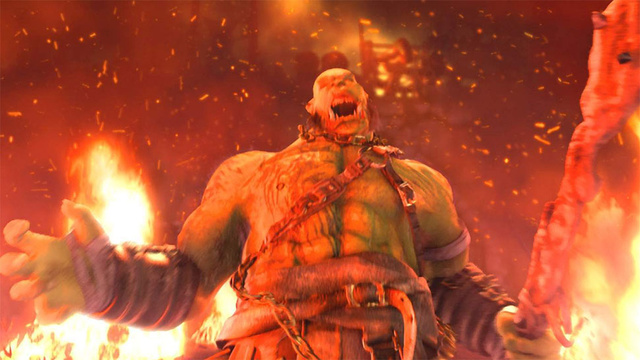Few Hollywood announcements are treated with such fierce-yet-wounded anticipation as video game adaptations. Full of incredible artistry, instantly-recognisable characters and an increasingly-mature approach to storytelling, you’d be forgiven for thinking gaming is a medium particularly well suited for making the jump to the silver screen. But history tells another story.
This piece was originally conceived as a “good, bad and ugly” of game adaptations. But when the best the sub-genre has thrown up is the instantly-forgettable Prince of Persia: The Sands of Time, you’re left clutching at straws to fill that “good” slot. Gamers have been left burned time and again by sub-par cash-ins on some of their most beloved properties.
What the world of game adaptations does have, however, is a remarkable knack for creating good stories off-camera. Indeed, it seems impossible to embark on a production without some sort of behind-the-scenes drama overshadowing the eventual flick. In fact, some of the most interesting stories surround those that never made it to the big screen at all.
Here, we’ll take a look at some of the biggest flops and near misses, and what the future may hold for the video game flick.
The Super Mario Brothers’ Dystopian Nightmare
Of all game-to-movie adaptations, there is none more notorious than the Super Mario Brothers film. It was the first, with none of the cynical baggage years’ worth of failed game-to-movie adaptations have left us with: it had a considerable budget, it had bonafide Hollywood stars in it. The end result? It was an absolute mess, like a hallucinogenic-fuelled fever dream interpretation of what Mario is, created by someone who has only ever had the synopsis of the game read to them, backwards, by Rutger Hauer playing a dying Roy Batty.
Though the news of a Super Mario Brothers film was initially met with enthusiasm, it quickly became clear that the movie’s creators had no idea how to make a coherent film from what is essentially an absurd explosion of colours, monsters and incessant forward momentum. A first draft of the script sounded almost credible — with its princesses and castles, the original treatment of a subversive fairytale reading of the characters sounds valid. But, when original director Greg Beeman left the project to be replaced by Max Headroom creators Rocky Morton and Annabel Jankel, things got weird. The script changed hands at least 10 times, and ended up being something like the residue you’d get left with if you boiled down Mad Max,Metropolis and The Never Ending Story. The Mushroom Kingdom as a futuristic Stalinist dystopia? You’ve got it. Barry Morrow, whose writing made up the backbone of the patchwork script, admitted to only playing the game for a single day before putting pen to paper. And it shows.
Still, this dark and subversive take on the game was enough to court some big Hollywood stars — Dustin Hoffman and Tom Hanks were both linked to the lead role before fellow heavyweights Bob Hoskins and Dennis Hopper were cast as Mario and King Koopa respectively. But of course, once Nintendo got wind of the direction the film was taking, it stepped in and requested changes had to be made. Producer Roland Joffe was only too happy to make the changes — an Oscar and Palme d’Or-winning director, Super Mario Bros. was intended to turn his art-house production company Lightmotive into a blockbuster builder. Super Mario was to be its first cash-cow, and kiddie butts on cinema seats was key to that dream being a success.
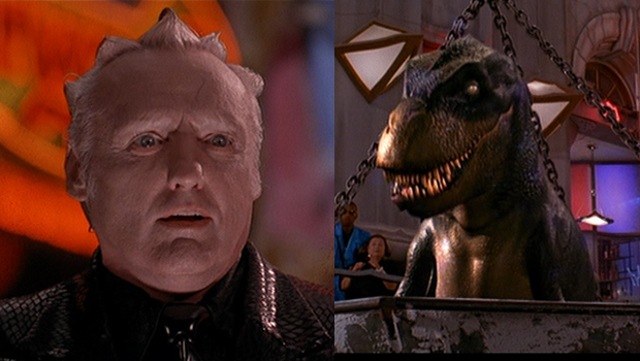
Filming, inevitably, was a tumultuous mess. The shoot overran by six months as on-set rewrites became commonplace. Stars Hoskins and John “Luigi” Leguizamo could only stomach the excruciating script by getting blind-drunk drinking scotch between scenes. A tonal roller-coaster, it took only $US20 million at the box office on a budget said to be well over $US50 million. Hoskins would later brand the experience both his worst job, biggest disappointment and the sole thing he’d change about his past. Ouch.
The film does get a few things right though. Bob Hoskins, despite his reservations, is perfectly cast — he’s as close to the caricature-like character as you’ll find in the real world. The jump boots are an elegant solution to explain away the brothers’ main in-game skill — flea-like jumping abilities — too. And the answer to the mystery of the Mario Brothers name is genuinely funny; Mario is the family name as well as the red overall-wearing plumber’s first name — you’ve Luigi Mario and Mario Mario.
But then, it gets pretty much everything else wrong. Before you even hit the bigger issues, how about this trio just as a warm-up:
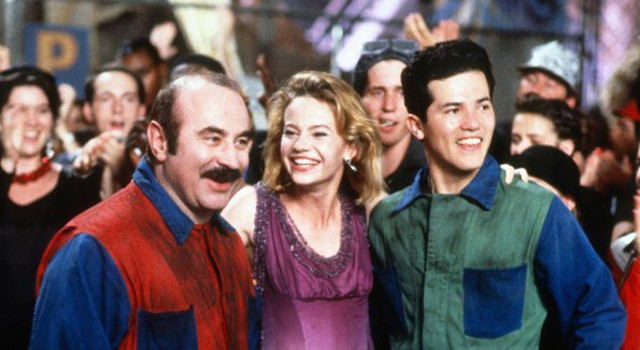
- Why, for the majority of the film, does Luigi wear red, and Mario wear green?
- Why is Luigi, the scaredy cat of the games, here presented as the brave one?
-
Where is Luigi’s moustache?
In answer to the third question — nowhere, that’s where. (In preparation for this article I re-watched the film for the first time in 20 years, and in the intervening years, it turned out that I had invented an epilogue scene in which Luigi comes to appreciate the art of manfully-groomed facial hair. I was disappointed when it didn’t appear during this latest viewing, showing just how much I must have attempted to rewrite the memory of the travesty as a child.)
For what is ostensibly a kid’s film, I was shocked now to see just how much of it was actually rather adult. Many of the half-man-half-dinosaur prosthetics are properly terrifying, while there are weird, inappropriately-sexual scenes littered throughout. There’s also a disconcertingly-lingering shot of one of the “good guy” goomba foot soldiers being set on fire, screaming into his harmonica. For kids who had come to see cute, mushroom headed Toad and the blue skies of the Mushroom Kingdom, they must have left the cinema shellshocked.
And yet, on one level, Super Mario Bros. is a success: It is one of Hollywood’s formative attempts at taking a beloved franchise, twisting it and transforming it beyond all recognition, and selling it back to horrified fans that pay their money out of blind devotion and then can’t look away as the objects of their dreams and hobbies are creatively executed in front of them. As the annual Comic-Con circus proves, it’s a formula that’s inexplicably profitable.
Monkey Island: The Movie — Starring Captain Jack Sparrow!
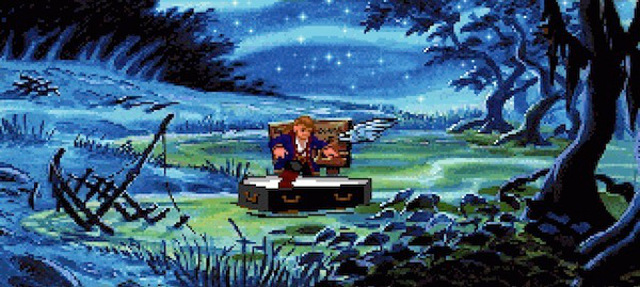
There’s no gaming franchise as well-suited to a movie adaptation than the Monkey Island games. Point-and-click adventures, they’re pretty much interactive movies anyway, focussing on the hilariously inept pirate Guybrush Threepwood, an undead pirate crew and a quest to lift a voodoo curse.
Sounds familiar? Yep, that’s mighty close to the Pirates of the Caribbean movies, right? The two are interwoven at an almost-atomic level.
Monkey Island, created to great critical acclaim by Ron Gilbert in 1990, was born of Gilbert’s love of two things — the Disney Pirates of the Caribbean 1960s theme park ride and the excellent pirate-fantasy novelOn Stranger Tides by Tim Powers. While the games quickly establish themselves as unique, there is definitely a debt owed to both the tone of the novel and the atmosphere of the ride, something Gilbert has never denied.
Fast-forward to the year 2000 and Lucasfilm (of whom Lucasarts — which published the Monkey Islandgames — is a subsidiary) is working on a film set to be called Curse of Monkey Island. Concept art was put together, and a script was written. Check out its synopsis — also sounds familiar, right? It was written by Ted Elliot. Guess what Elliot would go on to write? Yep, the Pirates of the Caribbean series.
The similarities between both franchises run deep. Orlando Bloom’s Will Turner is a dead-ringer for Guybrush, Geoffrey Rush’s Barbossa as ghostly as Monkey Island’s LeChuck. OK, Keira Knightley’s Elizabeth Swann is the governor’s daughter rather than the governor herself, but it’s not like Disney is known for its forward-thinking, empowered female leads, is it? But some scenes from the Pirates of the Caribbean series, such as the pirate town made of wrecked ships, and Jack Sparrow’s coffin boat (to name just two of many), are lifted completely from the Monkey Island games. Completing this incestuous circle of “inspiration”, the fourth Pirates film ended up being called On Stranger Tides, and was itself an adaptation of Tim Powers’s novel.
The saddest part of this tale? Since Disney bought out LucasFilm (and, by default, LucasArts), we’re now never likely to see a Monkey Island film. Pirates of the Caribbean is an established billion dollar franchise — why would Disney split its audience, resources and ideas over two similarly-seafaring properties? With the LucasFilm buyout (and Disney’s hoarder-like approach to intellectual properties), any chance of a Monkey Island film now rests deep beneath the waves alongside Davy Jones’s locker.
Raging Boll
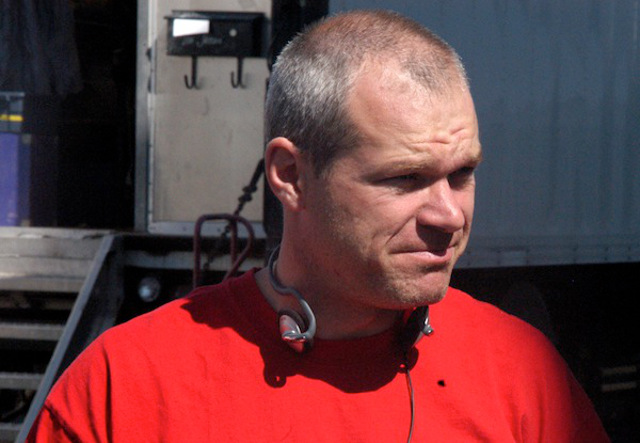
No man has single-handedly done more to set back the video game movie adaptation cause than German director Uwe Boll. If EA is the most-hated company in gaming, Uwe Boll is certainly a shoe-in for the most hated individual. Boll, to date, has worked on twelve video game movie adaptations (the majority of which he has a director’s credit on, plus a producer’s credit here and there), each so atrocious that one has to wonder if he’s intentionally out to shit on the franchises he’s associating himself with. They include House of the Dead, Alone in the Dark, Alone in the Dark II, BloodRayne, BloodRayne II: Deliverance, BloodRayne: The Third Reich, In the Name of the King: A Dungeon Siege Tale (and its sequels Two Worlds — crapping on another fantasy gaming franchise simply by sharing its name — and the forthcoming untitled third chapter), Postal, Far Cry and Zombie Massacre.
Many never get a cinema release, saving Boll from the easily-parsed humiliation of a scan of his Metacritic scores. But those that have avoided a straight-to-video reprieve face a critical mauling. On Rotten Tomatoes, Boll’s highest-rated video game adaptation, Postal, has just a 7 out of 100 rating.
In The Name of the King was described as being “…like a Florida dinner theatre production of The Lord of the Rings“. Of the 1 out of 100-rated Alone in the Dark, one critic said:
When the giant, intelligent bees of the future sift through the ashes of our civilisation, they will find Alone in the Dark, and they will understand.
Boll’s response to a similarly negative review of Postal in Wired? He emailed the critic, saying “you don’t understand anything about movies and you are an untalented wannabe filmmaker with no balls and no understanding what POSTAL is. You don’t see courage because you are nothing. and go to your mum and fuck her …because she cooks for you now since 30 years ..so she deserves it [sic]”
So how does Boll continue to get these films, none of which could be called anything close to a box office success, made? Tax loopholes. Of course — did you expect any other reason? Until a change in German law was passed in 2005, Boll was able to gain funding for his films through an investment scheme that made special allowances for film projects. It allowed investors in German-owned films to write off 100 per cent of their investments as a tax deduction, as well as allowing them to invest money that had been borrowed and write off any related loan fees. Tax payments were only required if the movies made a profit. Un-fucking-real.
Boll’s story does not end there however. In 2006, Boll challenged his critics to “put up or shut up”, challenging them to take him on in a boxing ring. Five fights went ahead, and five times Boll beat the crap out of those that had dissed him. And, of course, Boll made a shitty film documenting it all.
Video Game Movies: Taking It To The Next Level?
So can a decent video game film be made? Without a shadow of doubt. After seeing recently-released concept art for a cancelled Bioshock film, I had renewed faith in the potential of the medium. And there are some potential winners sitting on the horizon.
Angry Birds, for instance, seems a dead-cert for success (if arguably arriving three years too late, given its tentative 2016 release date). An animated movie made by the game’s developers Rovio alongside Sony Pictures Imageworks, it could be a feathered Finding Nemo.
And most promising of all is the Warcraft movie, also set for a 2016 release. It’s got some big names being attached to it, including Colin Farrell, Dominic Cooper and Clancy “The Kurgan” Brown. And in Duncan Jones, director of Moon and son of David Bowie, it has a director that not only is capable of making beautiful, exciting films, but is also a hardcore fan of the games. More than any video game adaptation before it, it could (whisper it) actually be good.
As for Nintendo, has it learned from its mistakes? Despite talk of a Metroid movie many years ago, the Japanese gaming giant has become very protective of its intellectual properties in the years since the Marioflick (and other IP tie-ins), shielding them from the grasping claws of Hollywood execs out to cash in. But, with Nintendo’s latest Wii U console struggling, the company has accepted it may have to once again loosen its grip on its most-beloved franchises. Here’s hoping it has learnt from its mistaken faith in theSuper Mario Bros. movie. Heaven forbid that Uwe Boll somehow be allowed to get his hands on The Legend of Zelda…

